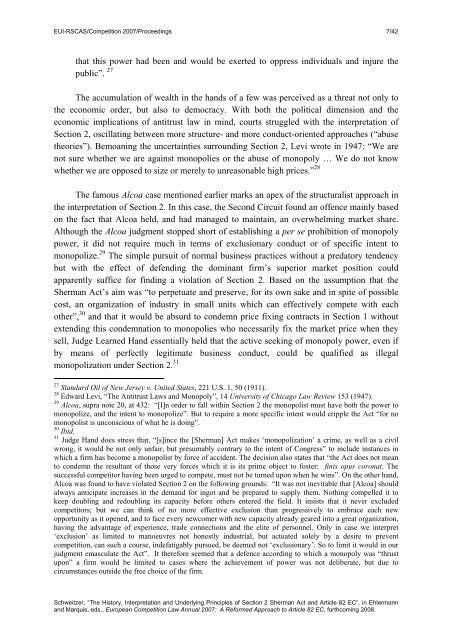The History, Interpretation and Underlying Principles of Section
The History, Interpretation and Underlying Principles of Section
The History, Interpretation and Underlying Principles of Section
Create successful ePaper yourself
Turn your PDF publications into a flip-book with our unique Google optimized e-Paper software.
EUI-RSCAS/Competition 2007/Proceedings 7/42<br />
that this power had been <strong>and</strong> would be exerted to oppress individuals <strong>and</strong> injure the<br />
public”. 27<br />
<strong>The</strong> accumulation <strong>of</strong> wealth in the h<strong>and</strong>s <strong>of</strong> a few was perceived as a threat not only to<br />
the economic order, but also to democracy. With both the political dimension <strong>and</strong> the<br />
economic implications <strong>of</strong> antitrust law in mind, courts struggled with the interpretation <strong>of</strong><br />
<strong>Section</strong> 2, oscillating between more structure- <strong>and</strong> more conduct-oriented approaches (“abuse<br />
theories”). Bemoaning the uncertainties surrounding <strong>Section</strong> 2, Levi wrote in 1947: “We are<br />
not sure whether we are against monopolies or the abuse <strong>of</strong> monopoly … We do not know<br />
whether we are opposed to size or merely to unreasonable high prices.” 28<br />
<strong>The</strong> famous Alcoa case mentioned earlier marks an apex <strong>of</strong> the structuralist approach in<br />
the interpretation <strong>of</strong> <strong>Section</strong> 2. In this case, the Second Circuit found an <strong>of</strong>fence mainly based<br />
on the fact that Alcoa held, <strong>and</strong> had managed to maintain, an overwhelming market share.<br />
Although the Alcoa judgment stopped short <strong>of</strong> establishing a per se prohibition <strong>of</strong> monopoly<br />
power, it did not require much in terms <strong>of</strong> exclusionary conduct or <strong>of</strong> specific intent to<br />
monopolize. 29 <strong>The</strong> simple pursuit <strong>of</strong> normal business practices without a predatory tendency<br />
but with the effect <strong>of</strong> defending the dominant firm’s superior market position could<br />
apparently suffice for finding a violation <strong>of</strong> <strong>Section</strong> 2. Based on the assumption that the<br />
Sherman Act’s aim was “to perpetuate <strong>and</strong> preserve, for its own sake <strong>and</strong> in spite <strong>of</strong> possible<br />
cost, an organization <strong>of</strong> industry in small units which can effectively compete with each<br />
other”, 30 <strong>and</strong> that it would be absurd to condemn price fixing contracts in <strong>Section</strong> 1 without<br />
extending this condemnation to monopolies who necessarily fix the market price when they<br />
sell, Judge Learned H<strong>and</strong> essentially held that the active seeking <strong>of</strong> monopoly power, even if<br />
by means <strong>of</strong> perfectly legitimate business conduct, could be qualified as illegal<br />
monopolization under <strong>Section</strong> 2. 31<br />
27 St<strong>and</strong>ard Oil <strong>of</strong> New Jersey v. United States, 221 U.S. 1, 50 (1911).<br />
28 Edward Levi, “<strong>The</strong> Antitrust Laws <strong>and</strong> Monopoly”, 14 University <strong>of</strong> Chicago Law Review 153 (1947).<br />
29 Alcoa, supra note 20, at 432: “[I]n order to fall within <strong>Section</strong> 2 the monopolist must have both the power to<br />
monopolize, <strong>and</strong> the intent to monopolize”. But to require a more specific intent would cripple the Act “for no<br />
monopolist is unconscious <strong>of</strong> what he is doing”.<br />
30 Ibid.<br />
31 Judge H<strong>and</strong> does stress that, “[s]ince the [Sherman] Act makes ‘monopolization’ a crime, as well as a civil<br />
wrong, it would be not only unfair, but presumably contrary to the intent <strong>of</strong> Congress” to include instances in<br />
which a firm has become a monopolist by force <strong>of</strong> accident. <strong>The</strong> decision also states that “the Act does not mean<br />
to condemn the resultant <strong>of</strong> those very forces which it is its prime object to foster: finis opus coronat. <strong>The</strong><br />
successful competitor having been urged to compete, must not be turned upon when he wins”. On the other h<strong>and</strong>,<br />
Alcoa was found to have violated <strong>Section</strong> 2 on the following grounds: “It was not inevitable that [Alcoa] should<br />
always anticipate increases in the dem<strong>and</strong> for ingot <strong>and</strong> be prepared to supply them. Nothing compelled it to<br />
keep doubling <strong>and</strong> redoubling its capacity before others entered the field. It insists that it never excluded<br />
competitors; but we can think <strong>of</strong> no more effective exclusion than progressively to embrace each new<br />
opportunity as it opened, <strong>and</strong> to face every newcomer with new capacity already geared into a great organization,<br />
having the advantage <strong>of</strong> experience, trade connections <strong>and</strong> the elite <strong>of</strong> personnel. Only in case we interpret<br />
‘exclusion’ as limited to manoeuvres not honestly industrial, but actuated solely by a desire to prevent<br />
competition, can such a course, indefatigably pursued, be deemed not ‘exclusionary’. So to limit it would in our<br />
judgment emasculate the Act”. It therefore seemed that a defence according to which a monopoly was “thrust<br />
upon” a firm would be limited to cases where the achievement <strong>of</strong> power was not deliberate, but due to<br />
circumstances outside the free choice <strong>of</strong> the firm.<br />
Schweitzer, “<strong>The</strong> <strong>History</strong>, <strong>Interpretation</strong> <strong>and</strong> <strong>Underlying</strong> <strong>Principles</strong> <strong>of</strong> <strong>Section</strong> 2 Sherman Act <strong>and</strong> Article 82 EC”, in Ehlermann<br />
<strong>and</strong> Marquis, eds., European Competition Law Annual 2007: A Reformed Approach to Article 82 EC, forthcoming 2008.

















